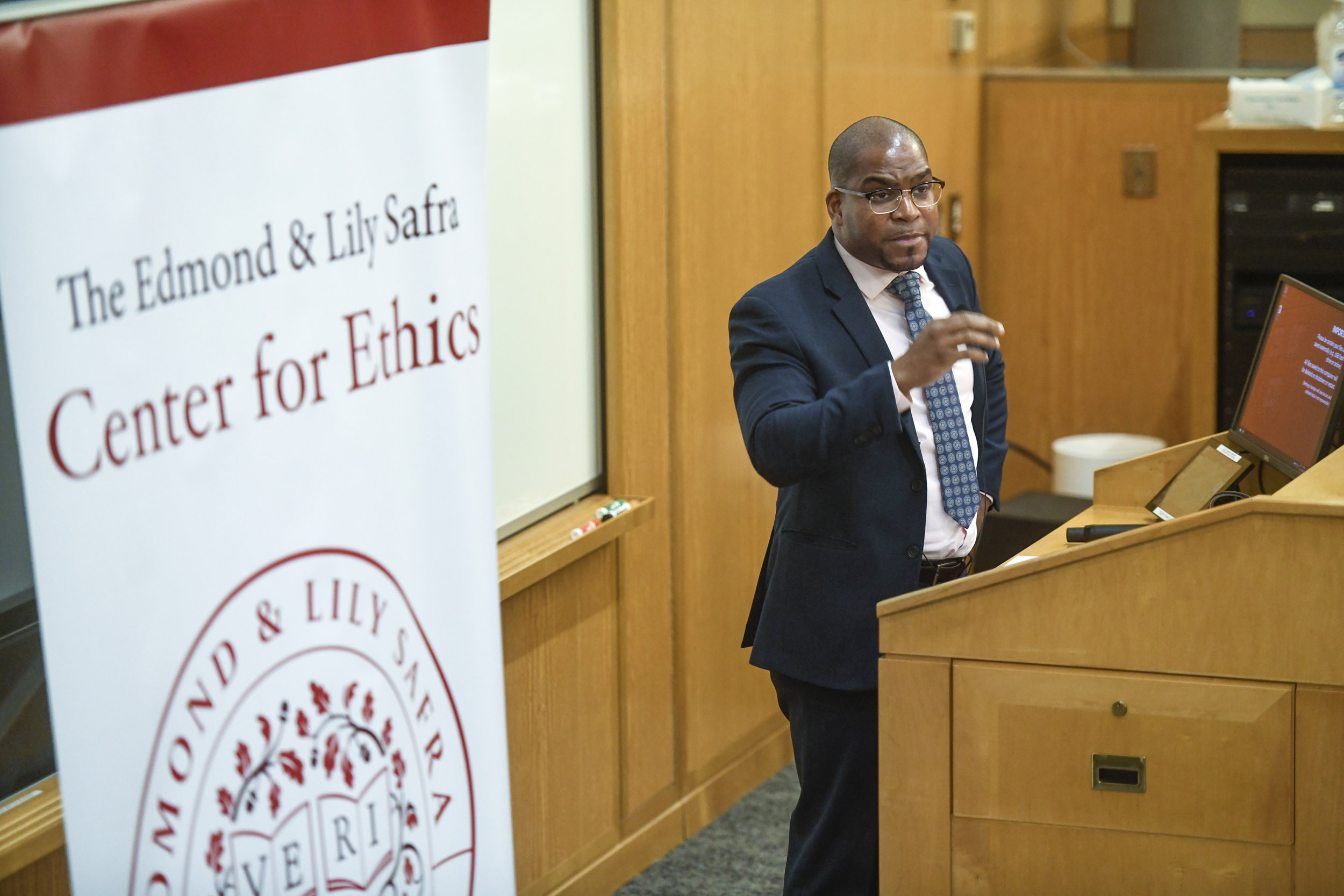
Brown University professor Melvin Rogers is a scholar in contemporary democratic theory and the history of American and African American political thought.
Jon Chase/Harvard Staff Photographer
How Black thinkers wrestled with founding U.S. values amid slavery
Brown University political scientist says Frederick Douglass, others found racial domination at odds with ideals of republicanism
The nation’s founders embraced republicanism, a political ideology rooted in classical Rome, with its emphasis on liberty, individual rights, civic virtue, and equality. Historians have noted that those ideas still inform much of what most American believe are the nation’s core values and have been at the heart of various national debates, including those involving equity and race.
But that history often overlooks the contributions to American republicanism of Black thinkers in the early 19th century. Some of their ideas, said Brown University professor Melvin Rogers, ran into a roadblock when it came to the idea of racial domination.
“The moment we begin to expand on narratives of the past, the moment we look beyond those figures that typically enjoy philosophical standard, we will find the tradition of republicanism not only alive in the 19th century, but that it is under the conceptual reconfiguration by African Americans,” Rogers said last week during an event, “Race and Domination: An Introduction to Black Republicanism.”
Rogers, who also serves as associate director of the Center for Philosophy, Politics, and Economics at Brown, has dedicated his work to contemporary democratic theory and the history of American and African American political thought. During an hourlong talk, Rogers expanded on his research on African American thinkers, their contributions to the theory of republicanism from the 1830s to the 1850s, as well as their commitment to freedom against domination.
“African Americans were very much committed to this tradition of thinking, but they also came to discover very quickly that it wasn’t conceptually ready for the situation that they found themselves in, that of racial domination,” Rogers explained. African American thinkers in the early 19th century, including Martin Delany, David Walker, Maria Stewart, and Frederick Douglass, viewed civic virtue as an important concept and transformed it into an idea of solidarity among Black people to fortify themselves and push back.
While the scholars agreed on racial solidarity, they did not agree on what it would look like. Delaney, for example, saw racial solidarity as a permanent state, Rogers said, and later endorsed the immigration of Black Americans back to Africa.
“For these figures, freedom and equality matter a great deal,” Rogers said. He explained that these writers, abolitionists, and activists proposed that the true meaning of equality of freedom exceeds institutional embodiment and requires individuals to pay particular attention to the symbols and ideas that deemed Black Americans of low worth in relation to their white counterparts.
“That then means that when we attack racial inequality, when we attack white supremacy, we must do it institutionally to be sure, constitutionally to be sure, but we must not lose track of the constitutional sphere upon which our institutions and our Constitution rests,” he said.
Diving into the political thoughts of early 19th-century Black intellectuals is vital not only to get the history right, but also because these contributions to republicanism give insight into the nature of white supremacy that continues to trouble current ethical and political life, Rogers said. The individuals and ideas he focuses on “are essentially the 19th-century version of Black Lives Matter” movement. Both ask vital questions of the culture and share the belief that the success of the U.S. is fundamentally connected to the status of African Americans and that success depends on the extent to which politics can show equal regard for Black and white Americans.
“I think that they both are on the same page. That’s not to say that the context is the same. The context has changed in dramatic ways,” he said. “But there is this persistent legacy that we find ourselves grappling with again and again.”
Danielle Allen, the James Bryant Conant University Professor and director of the Edmond and Lily Safra Center for Ethics, who introduced Rogers, said, “Melvin has written so intelligently and beautifully about John Dewey and the history of African American thought.”
Rogers is currently working as co-editor of Oxford University Press’ New Histories of Philosophy series. He will work on Africana Philosophy, a project that looks at different figures in African American political thought. “This is a watershed moment for philosophy, for political theory, for African American studies across the board, to put a stake in the ground and say, ‘There is a canon here,’” Allen said.




